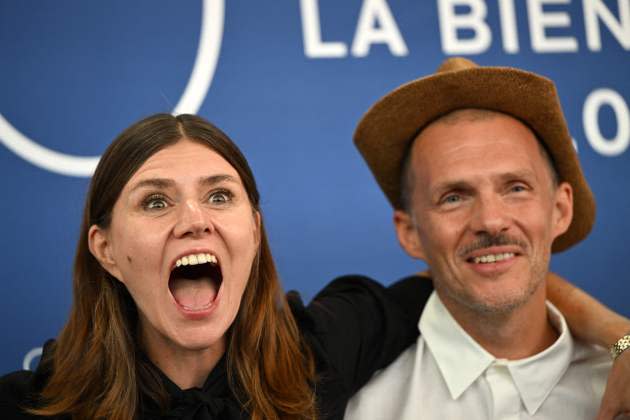Malgorzata Szumowska & Michal Englert Talk Championing Transgender Rights With Venice Title ‘Woman Of’: “This Film Is Needed Right Now In Poland”
- Oops!Something went wrong.Please try again later.

Polish director Malgorzata Szumowska and Michal Englert’s transgender drama Woman Of world premieres in Competition at the Venice Film Festival on Friday.
As ever the filmmaking team – who have been working together for more than two decades on titles such as Mug, In The Name Of and French-language drama Elles – are pushing boundaries in their native Poland.
More from Deadline
Set against the backdrop of the country’s transition from communism to capitalism, Woman Of follows protagonist Aniela Wesoły across the course of 45 years as she seeks to live freely as a trans woman in a small provincial town.
The film charts Wesoly’s journey with her wife, as the couple navigate her transition in an environment where it is neither recognized nor accepted.
“We’ve been thinking about this for a long time. The first impulse was 20 years ago when Michal [who is also a cinematographer] filmed one of the first [transition] surgeries,” says Szumowska.
“But there was no transgender discussion at that time, it was like it completely didn’t exist,” she continues. “We came back to that story because of what’s going on right now in Poland and in the world, but especially in Poland.”
The country has the worst track record in Europe for respect of LGBTQ+ rights, according to a report by rights group ILGA-Europe in May.
Same-sex relationships have been legal in the country since 1932, but same-sex marriage and civil unions are not recognized, conversion therapy (which is banned in a growing number of European countries) is encouraged, and same-sex couples are not allowed to adopt.
In the spring of 2020, 100 municipalities across Poland declared themselves LGBT-free zones, in a move encouraged by the conservative ruling Law and Justice party (PiS) and local representatives of the Roman Catholic church.
The film’s Woman Of title is inspired by Andrzej Wajda’s films Man of Marble (1977) and Man of Iron (1981), which challenged Communist rule and also supported the rising Solidarity labor movement of the time.
Like those films, Woman Of coincides with a crossroads moment for Poland ahead of October 15 national elections, in which the Law and Justice party is hoping to win a third term in office, amid growing disenchantment over its conservative rule among younger voters.
The filmmakers wrote the screenplay from stories told to them by transgender people, having focused their research on people approaching their 50s and living in small towns.
“It was a definite goal to follow a character that was close to us in age and then we discovered this interesting parallel between the transition of the main character and the transition of our country,” says Englert.
Szumowska adds. “The situation looks very different in a small town. You meet people who are actually not allowed to do any coming out. They are living half-lives.”
The couple at the heart of the film is inspired by a couple the filmmakers met during their research, although the storyline is drawn from different accounts.
“They had two children and are still together as a couple, even though they should be divorced because there are no civil unions for LGBTQ people. They went through hell and stayed together,” says Szumowska.
“This is not a political film but rather a love story about love in a system which is very much against that love and very much against LGBT people. It’s not militant or political.”

Woman Of
In a reflection of the way in which transgender identities are denied in Polish society, say the filmmakers, the production was unable to find a suitable transgender actress to play the role of Aniela.
She is played instead by cisgender actress Małgorzata Hajewska-Krzysztofik, with Mateusz Więcławek playing her young self.
Joanna Kulig, who previously worked with the directors on Elles, co-stars as Aniela’s wife Iza, with Bogumiła Bajor playing the character as a young woman.
“We did a casting and tried hard to have a trans actress for the main part but we couldn’t. There are no trans actors and trans actresses in Poland because the system of education is locked for them,” says Szumowska.
“There are no trans people studying at actors’ schools, maybe there are few people right now, but not from before. So, we couldn’t find a trans person of our age with acting experience… that shows how much the system in Poland is f**ked up.”
However, the filmmakers still worked closely with the transgender community in Poland, casting many of the people who attended the auditions in other roles throughout the movie.
“We have trans people playing CIS characters. They liked it and found it open-minded. It’s maybe the first time in this part of Europe, where this has happened,” says Szumowska.
“So, we had a lot of trans people on the film but not for the main character as we were not able to find someone for that complicated part. Our trans consultants, who accompanied us throughout the film, accepted this.”
Another challenge was securing financing for the production.
“It was quite complicated because of the sensitive subject-matter. We weren’t sure if we were going to get the Polish Film Fund, and finally they did support us,” says Szumowska.
“Which was unexpected,” adds Englert.
However, the grant only covered part of the budget so the project was stalled for a time, until billionaire Polish entrepreneur and commodities trader Gregory Jankilevitsch invested in the film.
He and partner Katarzyna Jordan-Kulczyk take producer credits alongside Klaudia Śmieja-Rostworowska, who is producing under the banner of No-Mad Films (a partnership between the Nowhere and Madants production companies), Bogna Szewczyk-Skupień, Szumowska and Michal Englert.
“It was just eight months ago…. Once we’d shot the film, we shared a link with Venice and then when they said, ‘yes, we want the film’, we were rushing to get it finished,” recounts Szumowska.
The final piece of the production-to-release chain came together on the eve of the Venice world premiere, with Warsaw-based distributor Next Films acquiring Polish rights.
“It all came together fast and kind of unexpectedly, but I don’t think it’s a coincidence. This film is needed right now in Poland,” says Szumowska.
Best of Deadline
2023 Premiere Dates For New & Returning Series On Broadcast, Cable & Streaming
Venice Film Festival 2023 Photos: Jessica Chastain, Peter Sarsgaard 'Memory' Premiere
SAG-AFTRA Interim Agreements: Full List Of Movies And TV Series
Sign up for Deadline's Newsletter. For the latest news, follow us on Facebook, Twitter, and Instagram.

